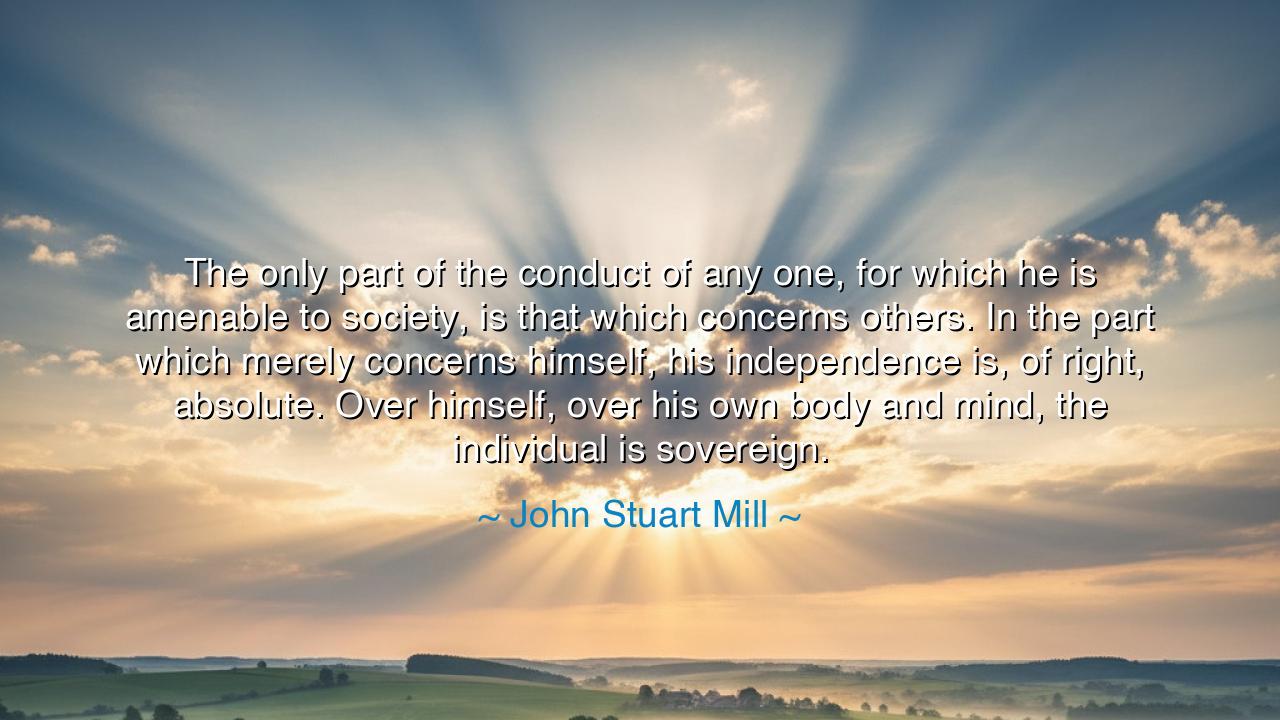
The only part of the conduct of any one, for which he is amenable
The only part of the conduct of any one, for which he is amenable to society, is that which concerns others. In the part which merely concerns himself, his independence is, of right, absolute. Over himself, over his own body and mind, the individual is sovereign.






Hear now the immortal words of John Stuart Mill, philosopher of liberty and guardian of conscience: “The only part of the conduct of any one, for which he is amenable to society, is that which concerns others. In the part which merely concerns himself, his independence is, of right, absolute. Over himself, over his own body and mind, the individual is sovereign.” These words, drawn from his timeless work "On Liberty" (1859), are not merely the thoughts of a scholar, but a declaration of spiritual and civic freedom — a torch passed down from the Enlightenment to all who would live as free beings. In them, Mill sets forth one of the great moral laws of civilization: that freedom is sacred, but it is bound by the border of harm. Beyond that border, the human spirit must bow to no master but its own.
In the age in which Mill wrote, the air of Europe still trembled with the echoes of revolution — the people had risen against kings, yet even in liberty they found new tyrannies: the tyranny of the majority, the oppression of opinion, the subtle chains of conformity. Mill saw that political freedom meant little without moral independence — that the greatest danger to the individual was not only the law of the state, but the judgment of the crowd. Thus he proclaimed the sovereignty of the self: that every man and woman owns the dominion of their own mind, that no priest, monarch, or mob has the right to dictate what one must think, feel, or become. “Over himself,” he said, “the individual is sovereign.” This was not rebellion — it was enlightenment.
The ancients, too, understood this sacred principle. The oracle at Delphi inscribed above her gate, “Know thyself.” For to know oneself is to govern oneself, and to govern oneself is to be free. Mill’s teaching is but the flowering of that ancient wisdom: that no external power, however noble in intent, can claim authority over the realm of one’s own body and mind. In this, he echoed the Stoic philosophers — men like Epictetus, who, though born a slave, declared that his body could be bound, but his mind could not. Thus Mill stands in the lineage of those who have sought the liberation of the soul, teaching that the true empire of man is inward, and its throne is independence.
Yet Mill did not preach selfishness. He did not call for chaos or indifference to the welfare of others. His law is clear and just: “The only part of conduct for which one is amenable to society is that which concerns others.” This means that freedom and responsibility are twins, born of the same parent. The individual’s sovereignty ends where another’s begins. In this harmony lies the balance of civilization — that we are free to pursue our truth, but not to harm, deceive, or dominate our neighbor. The wise have always known this boundary: it is the difference between liberty and license, between the self-mastered and the self-indulgent.
Consider the life of Socrates, who in ancient Athens lived and died for this very principle. He obeyed no authority but that of his conscience. When the city commanded him to cease questioning its values, he refused, saying that it was better to die in truth than live in obedience. He harmed no one, yet was condemned by the fear of the many. And though he drank the hemlock, his spirit triumphed — for he proved that the freedom of thought cannot be executed. Mill’s words, written two millennia later, carry the same defiance and grace: that independence of mind is the birthright of all who think, and that to surrender it is to betray the essence of one’s humanity.
Mill’s vision was not merely political, but deeply moral. He understood that society cannot be good if its citizens are not free, for virtue itself withers under coercion. Forced virtue is hypocrisy; only the liberty to choose allows goodness to shine with sincerity. To govern oneself — to act from reason, not from fear — is to become both free and moral. Thus, his doctrine calls not for rebellion, but for self-mastery. The greatest kingdom, he teaches, is the realm of one’s own will, where discipline and freedom coexist like the two wings of a bird.
O listener, take this teaching as a mirror for your life. Be sovereign over your body and mind. Guard your independence from the noise of the world, yet use your freedom not for indulgence, but for purpose. Speak truth, even when the crowd scorns you. Live by conscience, even when comfort tempts you. Respect the liberty of others as you would guard your own. For every soul that lives by this law adds strength to the foundation of justice and peace.
And so, let the words of John Stuart Mill echo through the ages as both warning and blessing: Freedom without wisdom is peril, but wisdom without freedom is death. Be wise, therefore, and be free — not as one who defies others for pride, but as one who masters himself for truth. For when each man and woman becomes sovereign over the self, then, and only then, shall the world be governed in harmony.






AAdministratorAdministrator
Welcome, honored guests. Please leave a comment, we will respond soon